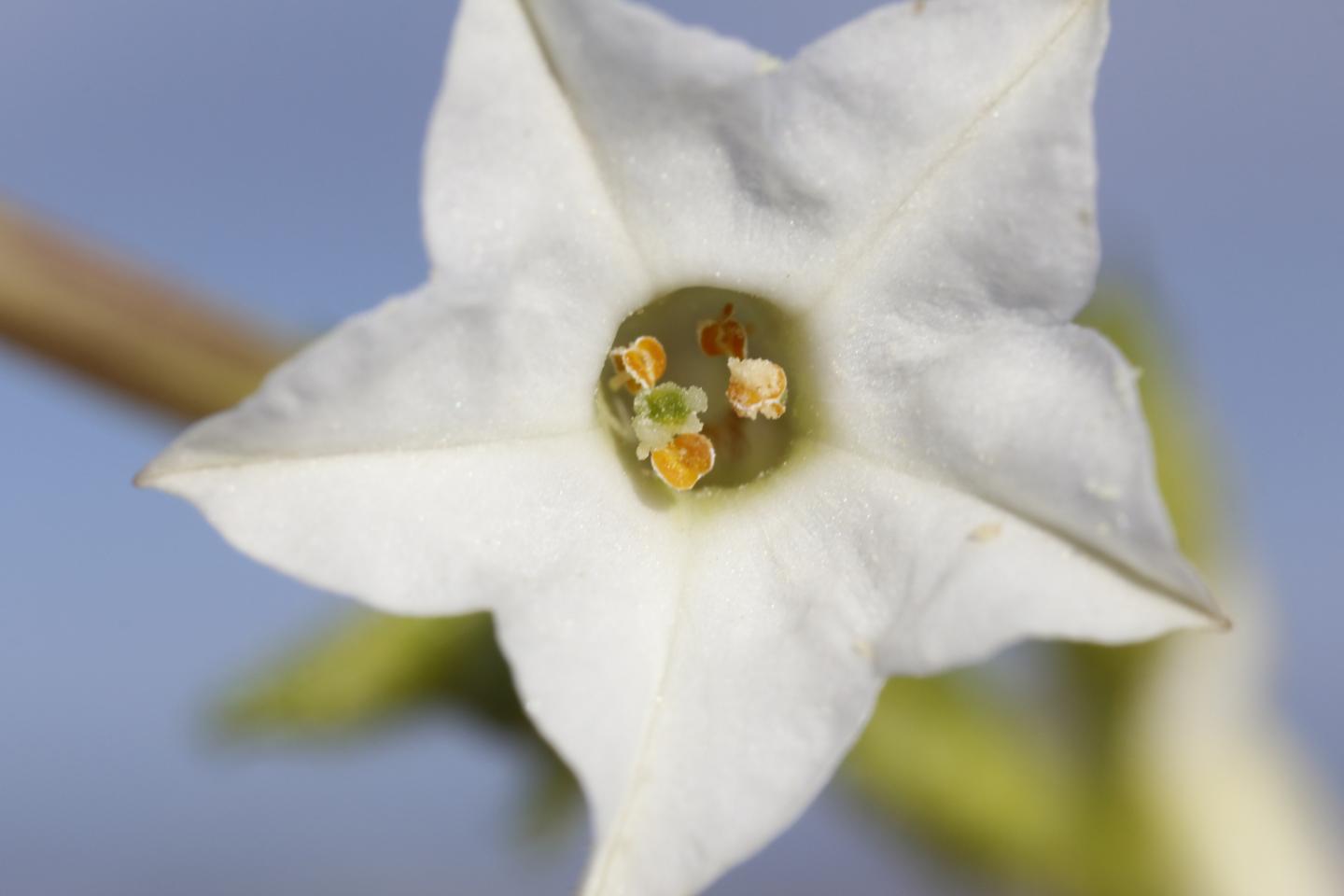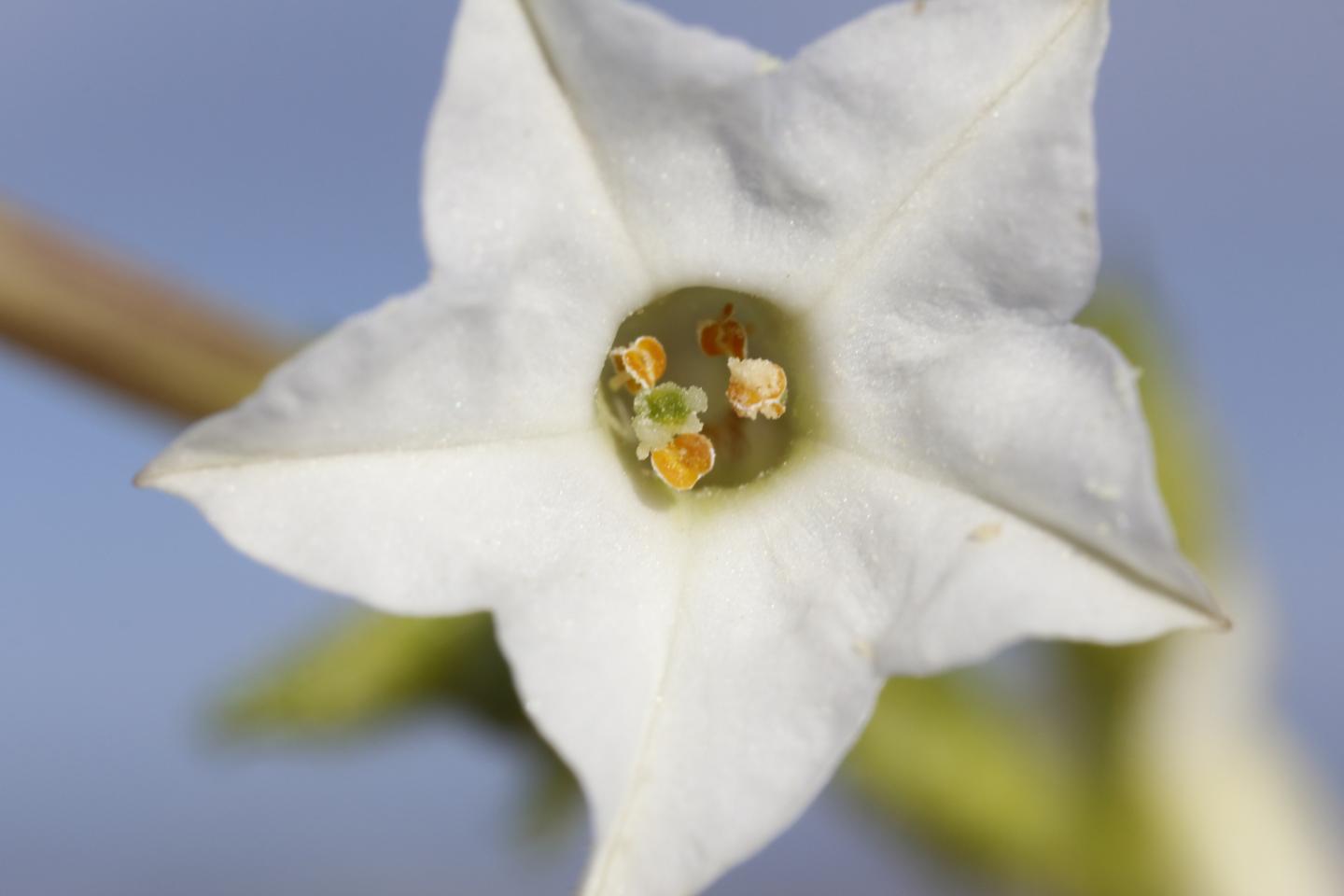
Credit: Danny Kessler / Max Planck Institute for Chemical Ecology
Scientists from the Max Planck Institute for Chemical Ecology in Jena and the University of Heidelberg, Germany, illuminated the diversity and different accumulation of chemical substances in the tissues of the ecological model plant Nicotiana attenuata. For their results, they used computational metabolomics and information theory. This approach was specifically designed for this study and enabled the researchers to study plant metabolism at the level of single organs. This new method allows for a more efficient access to the diversity of plant metabolites and for a more rapid identification of the genes which regulate their biosynthesis. (Proceedings of the National Academy of Sciences of the United States of America, November 2016, DOI: 10.1073/pnas.1610218113)
Plants are master organic chemists. They are able to produce very complex blends of different chemical substances. The biosynthesis and the accumulation of plant secondary metabolites are physiologically adapted to the individual requirements in the respective plant tissues. A team of scientists led by Emmanuel Gaquerel from the University of Heidelberg and Ian Baldwin from the Max Planck Institute for Chemical Ecology has now analyzed the metabolome, the entire set of chemicals, in the tissues of the ecological model plant Nicotiana attenuata.
The following questions were of central interest: Which plant tissues exhibit distinct metabolic profiles, which plant secondary metabolites are primarily accumulated locally in the tissues of particular organs, and finally, how can this information contribute to the identification of the genes that regulate metabolite production?
To answer these questions, the researchers harnessed the emerging research field of metabolomics and developed new computational methods for the assessment of analytical data retrieved from the mass spectrometric substance analyses. The goal of metabolome research is to identify and quantify the entirety of metabolites of an organism and their interactions. "We implemented a workflow that allows metabolite spectra to be rapidly aligned so as to make predictions about metabolite identity," Emmanuel Gaquerel explains. "Computational metabolomics encompasses all bioinformatics approaches that facilitate computer-based inferences on the annotation of unknown metabolites from large-scale complex metabolomics data."
For their study, the scientists analyzed the metabolic profiles of 14 different dissected tissues of tobacco plants, such as the floral organs, the stem, leaves, seeds and roots. "We had expected that the metabolic profiles of floral organs would differ significantly from other parts of the plant. However, there were also considerable differences between the individual floral organs. The very high degree of metabolic specialization we found in the anthers of tobacco flowers came as a particular surprise," Dapeng Li, first author of the study and a PhD student at the Max Planck Institute, reports. The anthers belong to the stamens, which are considered the male parts of a flower. They contain the pollen sacs in which pollen is produced. Anthers contain specific phenolic derivatives, which have also been found in the pollen coat in previous studies. The biosynthesis of these phenolic derivatives and their accumulation in the anthers substantially contribute to the unique metabolic profile of the male reproduction organs.
The application of tools and concepts based on information theory approaches in order to score metabolic diversity facilitated new insights into the function of single substances in this study. The key idea is to consider tissue metabolic diversity as a type of information, like any other, which can be statistically analyzed. In order to link metabolic function to individual genes, the scientists developed an atlas of genes and secondary metabolites which share similar activation patterns in the different tissues of tobacco plants. Based on these patterns, they were able to identify candidate genes which may be responsible for regulating the biosynthesis of ecologically-important secondary metabolite. Particularly with respect to metabolites whose biosynthesis has not yet been elucidated, this new approach has a trend-setting potential and will contribute considerably to further research in plant metabolism.
Ian Baldwin, director of the Department of Molecular Ecology at the Jena Max Planck Institute, contributed immensely to the fact that Nicotiana attenuata has become an important model organism for studying interactions between plants and their environment. "Plants modulate in a very sophisticated manner their accumulations of metabolites at tissue/organ levels. Elucidating how this is achieved is central if we are to understand how plants survive in nature," Baldwin summarizes the results of the new study. [AO/KG]
###
Original Publication:
Li, D., Heiling, S., Baldwin, I. T., Gaquerel, E. (2016). Illuminating a plant's tissue-specific metabolic diversity using computational metabolomics and information theory. Proceedings of the National Academy of Sciences of the United States of America, Early Edition, DOI: 10.1073/pnas.1610218113
http://dx.doi.org/10.1073/pnas.1610218113
Further Information:
Prof. Ian T. Baldwin, Max Planck Institute for Chemical Ecology, Hans-Knöll-Str. 8, 07743 Jena, Germany, 49-3641 57-1101, E-Mail [email protected]
Dr. Emmanuel Gaquerel, Centre for Organismal Studies Heidelberg, Im Neuenheimer Feld 360, 69120 Heidelberg, 49-6221 54-5589, E-Mail [email protected]
Contact and Media Requests:
Angela Overmeyer M.A., Max Planck Institute for Chemical Ecology, Hans-Knöll-Str. 8, 07743 Jena, 49-3641 57-2110, E-Mail [email protected]
Download high-resolution images via http://www.ice.mpg.de/ext/downloads2016.html
Media Contact
Dr. Emmanuel Gaquerel
[email protected]
49-622-154-5589
http://www.ice.mpg.de





